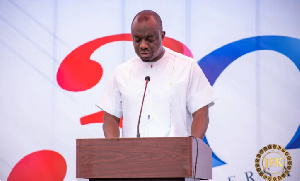Business News of Tuesday, 4 October 2022
Source: Richmond Kwame Frimpong
The economy, your finances – A way out for all
2019 and the ensuing years have been difficult. COVID–19 redefined how we should survive and thrive in not just our health but most importantly our finances too.
Award-winning financial advisory Consultant – Richmond Kwame Frimpong - has proposed a smart, simple instructional guide on how to survive the current economic crises for all (Country, Corporates, and Citizenry).
In his latest book – Good Money Habits in Bad Economic Times, he shares how to be financially independent regardless of the times.
He argues that economic crises are significant deterioration of economies over a long period outside the acceptable indicators of change. During global economic crises, the economic performance of countries sees a decline in production and demand, rising unemployment, and bankruptcy of businesses.
This results in increased poverty levels globally. When an economic crisis is devastating and prolonged, there is a depression. When it is devastating, but not prolonged, it is a recession. Recessions and depressions are similar. In both cases, the economy declines, and unemployment rises. However, depression is more severe and usually longer lasting.
The current global economic crises are a result of the lingering impacts of COVID-19 economic downturns and supply chain disruptions, the Russia-Ukraine war, inflation, global food and energy shortages, debt crises in developing countries, unwinding asset bubbles in the Americas, Europe, and Asian.
Scanning through economic history, this is comparable to the great depression of 1929-1939 which is considered the worst economic and financial disaster of the 20th century caused by the wall street crash. Next is the OPEC oil price shock of 1973.
Then, the Asian crisis of 1997 which is also known as the Asian flu began in Thailand spreading to east Asia and its trading partner, and the most recent 2008 financial crisis can be considered a dominant example.
The difference between the COVID-19-induced global economic crises and the ones cited above from 1973 to 2008 is that COVID-19 resulted in a global triple shock; simultaneously covering demand, supply, and financial disruptions.
Ironically, before COVID-19, the world was facing growth uncertainty and there was a tendency for a reduction in the global output.
This uncertainty created conflict among different global economic giants and these conflicts negatively affected the world macro-economic indicators and shrank global growth and trade volume.
The International Monetary Fund (IMF) for instance warned the “US-China trade war will cut the global growth slowest pace since 2008-2009 financial crisis”. Additionally, in November 2019 financial times highlighted that “because of trade tensions global trade balance shrank 1.2 percent”.
In 2020 the global economy is estimated to have shrunk by about 5.2% representing the deepest recession since the second world war with the largest fraction of economies experiencing declines in per capita output since 1870. Additionally, economic activity among advanced economies dipped by about 7% in 2020 as domestic demand and supply, trade, and finance were severely disrupted.
Emerging market and developing economies (EMDEs) like the African continent equally experienced their first contraction in at least sixty years. Per capita incomes declined in excess of 3.6% dragging millions of people into extreme poverty.
Unlike a financial crisis which is limited to one sector, an economic crisis affects the whole economy. Unemployment rises, and GDP (which is the sum of everything a country produces over a specific period) stops growing or shrinks.
This dries up liquidity and in the case of covid-19 plus the Russian-Ukraine war, it resulted in global food and energy shortages, debt crises in developing countries hyperinflation.
The effect is that many get poorer, and the only way out is financial prudence and frugality through the application of “Good Money Habits”.
So, what do we do in these difficult economic times to avoid a financial crisis?
First, analyze your current financial reality by taking the two-level money habit diagnostic tests to determine your present situation.
Secondly, practice the 21 new money habits in the book – Good Money Habits in Bad Economic Times, based on your diagnostic test outcome.
Finally, sign up for the 21-day new money habits worksheet he provides to keep you in motion with your daily routine to help you stick to your good new money goals and act daily towards improvement.











